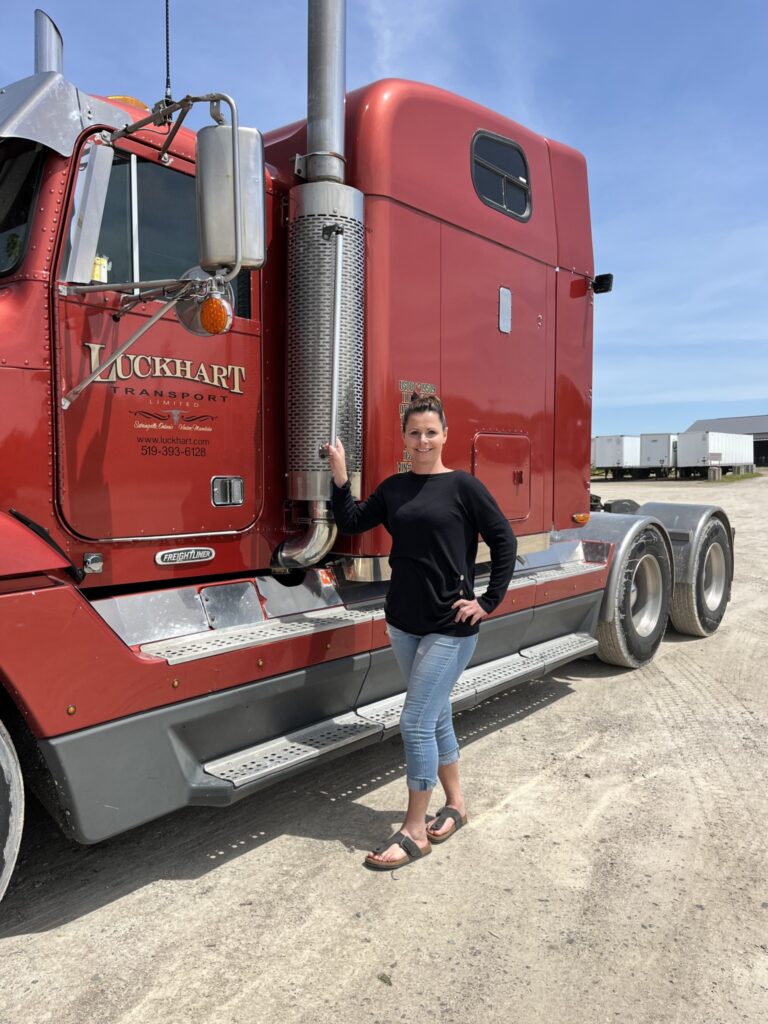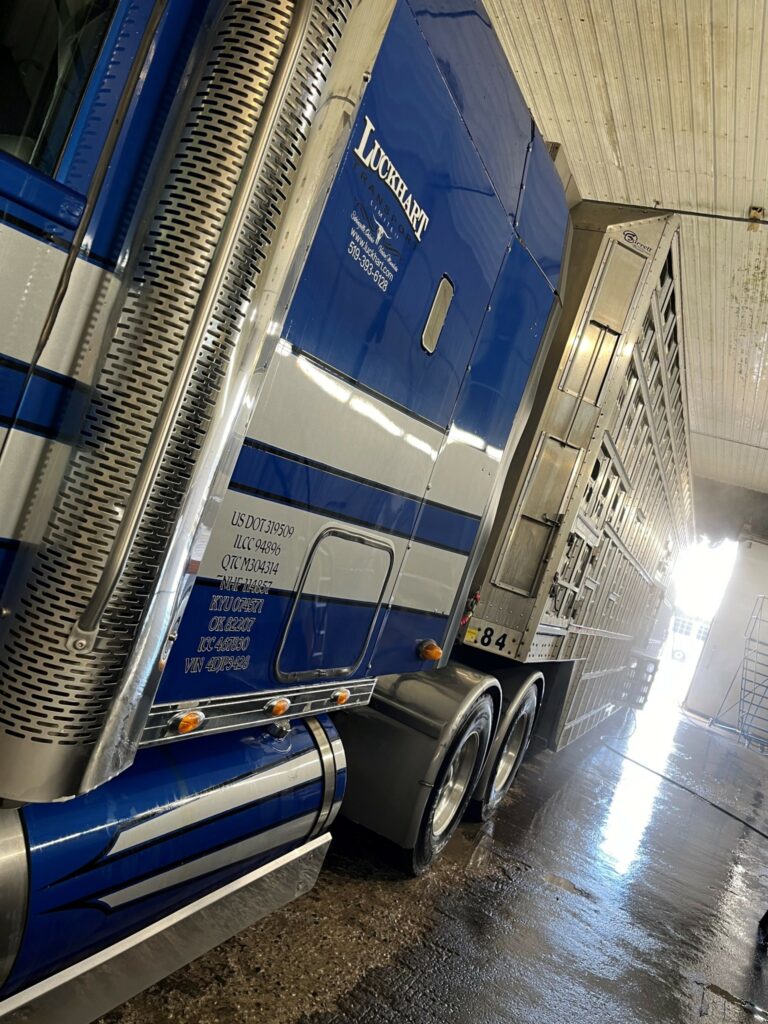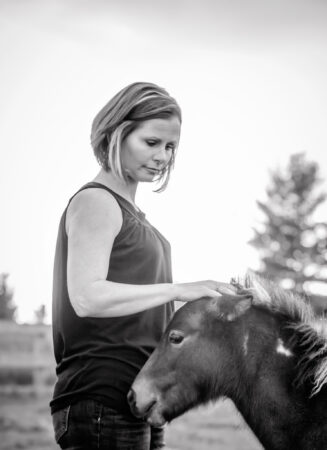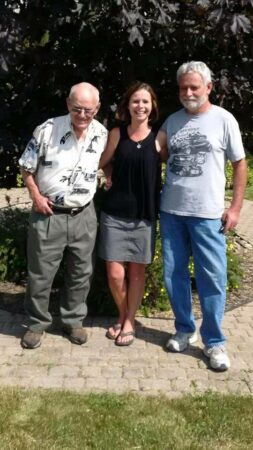Care for animals drives Luckhart Transport’s success
Fifteen-year-old Angie Luckhart learned her family’s unofficial motto the hard way.
“I’d been shovelling manure and washing trailers for a couple years,” she remembers. “But this one time I might have taken a few shortcuts so I could finish early and get to a party.”

Angie went to her party. And she had a pretty good time. But then she found herself being shaken awake at 2 a.m. by her dad, Doug Luckhart.
Doug was distinctly unimpressed with the job his daughter had done. “Anything worth doing is worth doing right the first time,” he said sternly. And then he sent her back to the yard – in the middle of the night – to re-wash the trailers until they were up to Luckhart Transport standards.
“I never, ever took a shortcut again,” laughs Angie. “Even today, if I find myself wanting to do something less than 100%, I hear his voice telling me that same thing.”
Founded on a love of animals
Today Angie – who uses her married name, Hurst – runs Luckhart Transport, while Doug enjoys a well-earned retirement. Angie is the third generation of Luckharts to own and operate the livestock hauling operation headquartered in Sebringville, Ont., about 60 km northeast of London. Its fleet now comprises 16 power units with another two on order, and a workforce of 45.
“My grandfather, Howard, started the business in 1951,” says Hurst. “What he really wanted to do was farm. But as one of seven children in a family with only one farm to share, that didn’t seem likely.”
Rationalizing that hauling livestock would allow him to continue working with the animals he loved, Howard bought his first tractor and established the business. It was a success right from the start, and over the years all three of Howard’s sons drove for him at one time or another.
Two of these sons, Doug and Tom, eventually bought into the company in the 1970s. It was a good time for small businesses, and Luckhart prospered through the ’80s and ’90s. More equipment was purchased, several smaller companies were bought out, and more land was acquired. This last was badly needed for assembling the large loads of swine the expanded company was now hauling all over Ontario, in addition to the cattle they brought in from Alberta.
By 1996 the company had a new purpose-built facility. It included a repair shop, offices, an indoor wash bay, and – uniquely – a wetland system designed to clean the wastewater from the wash bay. Created in collaboration with the Upper Thames River Conservation Authority, this system ensures water from the Luckhart facility is 99% pure when it returns to the water table.
Everything was going great.
And then, the 2003 Bovine Spongiform Encephalopathy (BSE) aka “mad cow disease” crisis hit. And Luckhart realized how vulnerable it was.
Crisis inspires focus on biosecurity
Hurst, who was by then working full-time running the dispatch office, remembers this as if it were yesterday. “We had every one of our trucks booked out, plus we’d hired seven other companies to help us move cattle across the border. The very next week, we had nine trucks sitting at the fence. It was like the tap turned off.”
Luckhart weathered that storm, but it wasn’t easy. It took a massive financial hit and had to lay off some staff for a while. But it also inspired the company to make two important changes. First, it diversified into other forms of livestock instead of relying so heavily on cattle. It also added some dry freight to its load boards. And second, it took a long, hard look at its in-house biosecurity measures.
“They were good,” says Hurst. “But we decided we wanted to do better.”
In this case, “better” turned out to be investing in a thermo-assisted drying and decontamination (TADD) dry-bay system. This specialized bay essentially “cooks” the washed trailers, killing any rogue pathogens that may have survived the washing and decontamination process. The company also established a new yard-flow system to further minimize risk of cross-contamination between trailers. It implemented third-party veterinary inspections, mandated disposable boot covers and overalls during cleaning, and ensured truck cab interiors were cleaned regularly as well.
Six years later these new measures had their ultimate test. A local vet told Luckhart one of its clients was struggling with a Porcine Epidemic Diarrhea (PED) outbreak. While PED doesn’t contaminate an animal’s meat or pose a risk to food safety, it can cause serious illness within a herd, particularly to younger animals.
Luckhart agreed to transport the sick animals to a local slaughterhouse. And then it ran the contaminated trailers through their entire biosecurity system. When those trailers were swabbed and tested at the end? Not a trace of the virus remained.
In for the long haul
For Hurst, all of this was a real-life reminder that hauling livestock was not for the faint of heart. But the business was in her blood. Not only had she been born into it, by now she’d fallen for a handsome driver who kept mysteriously showing up in her yard.
“He drove for his dad, Lloyd Hurst, who we’d often call for backup when we needed help with a load,” she laughs. “Finally, he took me on a ‘date’ to Quality Meat Packers in Toronto. And that was it.”
Hurst married the man – Kevin Hurst – 20 years ago and the couple has two sons, one of whom has just begun apprenticing as a 310T mechanic. She jokes that her dad made a shrewd business deal in marrying her off, since Luckhart later purchased the livestock arm of Lloyd Hurst’s transport business.
Angie Hurst made another important move in 2009. When her uncle decided to exit the business, she scraped together every dime she could to buy his shares. She later acquired a controlling interest in the company when her grandfather Howard passed away in 2021.
And that’s how Angie Luckhart Hurst became one of the first women in Canada to own and operate a livestock hauling fleet.
Sector deals with unique challenges
Over the years, Hurst has become an expert in the unique challenges faced by her industry. These could be divided into three broad categories: logistics issues related to care of the animals, evolving government regulations, and market fluctuations.
The most punishing of these is the logistics involved in ensuring the animals are transported safely and humanely. Growing up in this world, Hurst was surprised to learn not all transport companies face this level of complexity.
“I don’t want to say dry-freight haulers have it easy; there’s nothing easy about trucking. But I do think we have a lot more factors to consider.”
Angie Hurst
“I don’t want to say dry freight haulers have it easy; there’s nothing easy about trucking. But I do think we have a lot more factors to consider.”
Those factors include everything from keeping the trailers clean to ensuring the animals are fed, watered and at a comfortable temperature during transport. In summer, this might mean stopping to hose them down. In winter it might mean battening down the trailer with winter boarding and adding a large surplus of straw bedding.
All this is further complicated by regulations about how long animals can be in a trailer and how long drivers can be on the road. For cross-border transport, animals have to be inspected by a U.S. Department of Agriculture (USDA) or Canadian Food Inspection Agency (CFIA) veterinarian. But these officials are only available Monday-Friday from 8 a.m.-3 p.m. So, getting stuck in a traffic jam during a heat wave or in a winter blizzard – or having your loading delayed by an hour or two – are potential disasters that simply can’t happen.
“There’s a lot of risk managing, and there’s always a contingency plan,” says Hurst. “And, again, the best strategy is getting it right the first time.”

Livestock drivers: A special breed
Hurst says her number one defence against things going wrong is hiring the right people, especially drivers. Livestock drivers face demands and responsibilities beyond safely operating trucks and trailers. They oversee the loading and unloading of the animals. They need to know how many animals will fit into each section of every trailer, and how to recognize when an animal is unwell or unfit for transport.
Most importantly, they need to know how to protect those animals from the elements and make sure they arrive at their destination in a timely manner and without undue distress.
“We’ve had people apply for jobs – drivers who’d never hauled livestock. Some of them only make it two days,” says Hurst. “One of them told me, ‘You people are crazy.’”
She also makes sure all her employees are treated well and feel like family. This includes fair pay and generous benefits, along with extra perks like the fridges she kept stocked with snacks and meals for her drivers during the Covid-19 pandemic.
All this might be another example of Luckhart’s commitment to “doing it right.” And it’s certainly paid off. Some drivers come and go, but some have been on staff for 30-plus years. And today, some of them have children who drive for Luckhart as well.
“Every employee should feel like they matter, because at the end of the day they do,” says Hurst. “That’s what a family business is all about.”
What’s next for Luckhart?
Hurst is comfortable keeping the company exactly where it is: big enough to make a difference, small enough to do it right.
“I think it’s important to keep the company at a size that allows us to honour our family roots, remember where we’ve come from, and give our customers the best service possible.”
Things can change on a dime in this business – new viruses, new regulations, weird market fluctuations and more. But these are all challenges Angie is confident her team can meet.
And the animals?
If they’re traveling with Luckhart, they’re in safe hands. Guaranteed.
Have your say
This is a moderated forum. Comments will no longer be published unless they are accompanied by a first and last name and a verifiable email address. (Today's Trucking will not publish or share the email address.) Profane language and content deemed to be libelous, racist, or threatening in nature will not be published under any circumstances.
Great writing, thoroughly enjoyed the piece.
Sounds like a very decent company that takes care of their employees. Treat them right and they will go that extra mile for you.
I love animals but could never haul them to market because of that.
I also liked reading this well written article about a fine trucking company.
Lots of hard work and thoughtful determination.
I don’t know if it was because of the story or how well written it was, but this actually brought me to tears. I have assisted Luckhart over the years because of the company I work for and appreciate all that I’ve learned about Luckhart from this article. First I want to point out that the name should have been ‘Luckheart’ because it sounds like they put their heart into everything they do (after the first incident at least lol)!
Angie, you are incredible! It sounds like you grew up literally overnight and have a smart father to be thankful for. Of course, it didn’t start and end with him, every person is responsible for what they do with what they learn.
I have so much more respect for livestock haulers now, especially ones that care for the animals like you do! Please keep up the great work, we need to keep businesses like yours strong!! Hugs to your ‘entire family’!!


I’ve been trucking for over 40 years. Never hauled livestock but I love animals. If I didn’t live so far away I’d check them out. Sounds like a great company